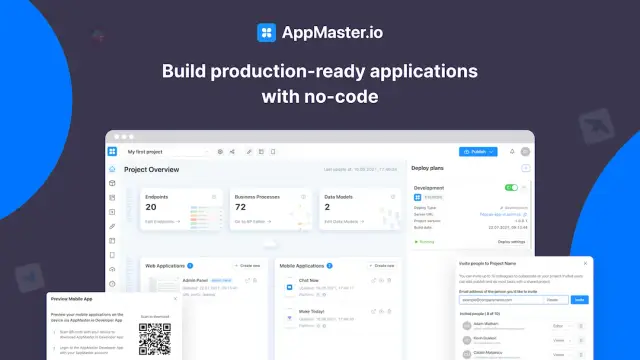The Benefits of Integrating Low-Code into Your IT Strategy
Discover how integrating low-code and no-code platforms into your IT strategy can streamline processes, promote innovation, and boost overall productivity. Learn the top benefits and real-world use cases of low-code adoption.

In today's rapidly evolving digital industry, businesses demand agile, innovative, and efficient solutions for taking on complex challenges. A growing trend in meeting these demands is the adoption of low-code platforms, which offer a myriad of opportunities to streamline processes, foster innovation, and maximize the potential of IT strategies.
Low-code platforms provide a visual, drag-and-drop interface, enabling developers and non-developers alike to build, customize, and deploy modern applications without the need to write extensive code. By embracing low-code integration in their IT strategy, organizations can minimize the time-to-market of applications, improve collaboration between development teams, and automate mundane tasks, freeing up resources for more vital and strategic initiatives.
Integrating low-code platforms into an IT strategy goes beyond simply deploying applications faster or cutting costs. It provides teams with the flexibility, adaptability, and scalability required to navigate the digital environment successfully and meet ever-changing customer needs and industry standards.
In this article, we will explore the key benefits of integrating low-code platforms into an IT strategy and provide real-world use cases to showcase the effectiveness of low-code integration in various industries and applications.
Key Benefits of Integrating Low-Code
Organizations that choose to incorporate low-code platforms into their IT strategy stand to benefit from many advantages. Here are some key benefits that showcase the potential of low-code adoption:
- Accelerated Application Development and Deployment: Low-code platforms simplify application ideation, design, testing, and deployment by providing visual tools and components that eliminate or significantly reduce the need for hand-coding. This dramatically reduces the development cycle and time-to-market for new applications.
- Increased Productivity and Efficiency: By automating mundane tasks and allowing for rapid prototyping, low-code platforms enable IT teams to focus on more strategic and innovative projects, making better use of their time and skills and driving greater productivity gains.
- Foster Innovation and Collaboration: Low-code platforms empower non-technical users, such as product managers and business analysts, to collaborate with developers directly. This democratization of application development leads to greater innovation as business users bring their unique perspectives and ideas to the table.
- Easier Scalability and Adaptability: Low-code applications are designed with modularity and reusability in mind, allowing organizations to quickly adapt to changes in the market and scale their solutions as needed. This flexibility is crucial for businesses to navigate the rapidly evolving digital environment and adjust their offerings in response to shifting customer expectations.
- Improved Integration with Existing IT Systems: Integrating low-code platforms with legacy systems and modern technologies, such as CRMs, databases, and APIs, is straightforward and seamless. This ensures that organizations can continue to leverage the value of existing investments while incorporating new, cutting-edge functionalities.
- Reduced Technical Debt and Maintenance: The visual tools and components provided by low-code platforms reduce the risk of manual coding errors and inconsistencies, leading to better code quality and maintainability. This results in a decrease in technical debt and an overall lower total cost of ownership for applications and systems.
Real-World Low-Code Integration Use Cases
Low-code platforms have already made their mark in various industries, driving success stories and demonstrating their value in addressing specific business challenges. Here are some examples of real-world low-code integration use cases:
Streamlined Financial Services
In the highly regulated financial services sector, low-code platforms have allowed companies to streamline operations, reduce manual data entry, and automate critical processes. For instance, a leading insurance company used a low-code platform to implement an application for managing claims and processing reimbursements, decreasing manual tasks and improving accuracy.
Modern Public Services
Government agencies face a myriad of challenges in delivering exceptional public services while adapting to ever-changing regulations and evolving technologies. By using low-code platforms, these agencies can modernize legacy systems, streamline workflows, and introduce new applications quickly. One example is a municipal department that employs a low-code platform to optimize complaint management processes and improve citizen engagement.
Scalable Healthcare Solutions
Healthcare providers must manage a multitude of patient records, treatment plans, and billing data while adhering to strict data protection regulations. A low-code platform enables these providers to effectively integrate disparate data sources, streamline administrative tasks, and improve patient care. For example, a hospital succeeded in implementing a low-code platform to create a patient management system that enhanced patient information accuracy and availability for healthcare professionals.

Empowered Retail Innovations
Low-code platforms enable retailers to create solutions that optimize supply chain efficiency, enhance customer experience, and modernize e-commerce platforms. A large-scale retailer used a low-code platform to develop a powerful inventory management system that integrated with their existing IT infrastructure. The result was improved stock management, real-time data availability, and better decision making.
These real-world use cases illustrate just a few of the many ways low-code integration can reshape traditional IT strategies and drive innovation across industries. As the digital industry continues to evolve and organizations face increasing pressure to adapt and scale, low-code platforms will play an ever more critical role in shaping the future of IT strategy and digital transformation efforts.
Implementing No-Code Solutions with AppMaster.io
Implementing low-code and no-code solutions as part of your IT strategy can be highly effective when you choose the right development platform. AppMaster.io is a powerful no-code platform that empowers businesses to create backend, web, and mobile applications with minimal coding.
With its unique combination of no-code tools for building visually appealing user interfaces and low-code tools for defining business processes, AppMaster.io stands out among competitors. This comprehensive platform offers numerous features designed to streamline the development process, making it an ideal choice for businesses looking to innovate faster and more efficiently.
Key Features of AppMaster.io
Some of the notable features of AppMaster.io that facilitate no-code implementation into your IT strategy include:
- Database schema visualization: Visually create data models and manage your database schema, making it easier for developers and non-developers to collaborate on application development.
- Visual business process designer: Create and manage business processes using a user-friendly, drag-and-drop interface, reducing the need for hand-coding while ensuring seamless application functionality.
- API and WebSocket endpoints: Build custom REST APIs and WebSocket endpoints to enable seamless communication between systems and applications, further expanding your IT capabilities.
- Web and mobile application design: Design visually appealing and highly interactive user interfaces for web and mobile applications, using AppMaster.io's drag-and-drop UI designer.
- Seamless app deployment: Automate the entire application deployment process, including source code generation, compilation, testing, and containerization, for a fast and efficient roll-out.
- Integrated development environment (IDE): Access a comprehensive suite of development tools designed to improve the application development process from start to finish.

AppMaster.io not only streamlines the development process but also makes it more cost-effective for businesses, enabling you to leverage the full potential of no-code integration.
Envisioning the Future of IT with Low-Code Platforms
With the increasing adoption of low-code platforms and their integration into IT strategies, the future of IT is evolving. These platforms are driving digital transformation, enabling businesses to respond more rapidly and effectively to market demands while reducing the time-to-market for new products and services. Some of the key ways that low-code platforms are shaping the future of IT include:
Democratising Software Development
By simplifying the software development process, low-code platforms are empowering non-developers and citizen developers to take part in application creation, fostering a more inclusive and collaborative environment. This democratization of software development leads to a more diverse range of ideas, ultimately driving innovation and progress within the industry.
Greater Focus on Innovation
In an increasingly competitive market, businesses must continuously adapt and innovate to stay ahead. Low-code platforms allow development teams to build, test, and deploy applications more rapidly, freeing up time and resources for brainstorming and implementing new ideas. This focus on innovation paves the way for next-generation products and services that cater more effectively to changing customer demands.
Enhanced Agility and Adaptability
Low-code platforms facilitate the creation of modular, reusable, and customizable software solutions that can be easily adapted to meet evolving business objectives and market circumstances. This inherent flexibility allows IT departments to be more agile, addressing new challenges and opportunities as they arise.
Embracing the Power of Digital Transformation
As businesses continue their digital transformation journey, low-code platforms play a crucial role in streamlining operations, eliminating bottlenecks, and driving efficiency across the organization. By seamlessly integrating digital technologies into their IT strategy, organizations can transform not only their internal processes but also their customer-facing services, fostering stronger relationships and improved customer satisfaction.
Smarter Integration of Emerging Technologies
Low-code platforms are ideally positioned to facilitate the integration of emerging technologies, such as artificial intelligence, machine learning, and the Internet of Things, into your IT strategy. By making it easier to create applications that harness the power of these cutting-edge solutions, businesses can stay ahead of the competition while optimizing their operations and unlocking new opportunities for growth.
Low-code and no-code platforms are revolutionizing the way organizations approach software development, driving innovation, and shaping the future of IT. By integrating no-code solutions like AppMaster.io into your IT strategy, you can enhance productivity, streamline processes, promote collaboration, and ultimately position your business for long-term success in the digital era.
FAQ
A low-code platform is a development tool that simplifies the process of building and deploying customized software applications. It provides a visual interface that allows developers to easily design, prototype, and create applications with minimum or no hand-coding.
Low-code platforms can streamline development processes, reduce time-to-market, increase productivity, foster innovation, enhance collaboration, and offer easier scalability and adaptability.
Some popular low-code/no-code platforms include AppMaster, OutSystems, Mendix, and Salesforce Lightning.
AppMaster.io is a powerful no-code platform that allows for the integration of backend, web, and mobile applications into an IT strategy. It accelerates application development, offers extensive customization options, and eliminates technical debt.
Yes, most low-code platforms can integrate seamlessly with legacy systems and modern technologies, such as CRMs, databases, and APIs, to create customizable and adaptable solutions.
Yes, low-code platforms are designed to empower both developers and non-technical users, like business analysts and citizen developers, to build customized applications more rapidly and efficiently.
Low-code applications are highly scalable and adaptable, as the platforms offer easy-to-use tools and components to create modular, reusable, and customizable applications.
While security is an essential concern in application development, reputable low-code platforms like AppMaster.io prioritize security features to ensure that applications are secure and adhere to industry standards.





